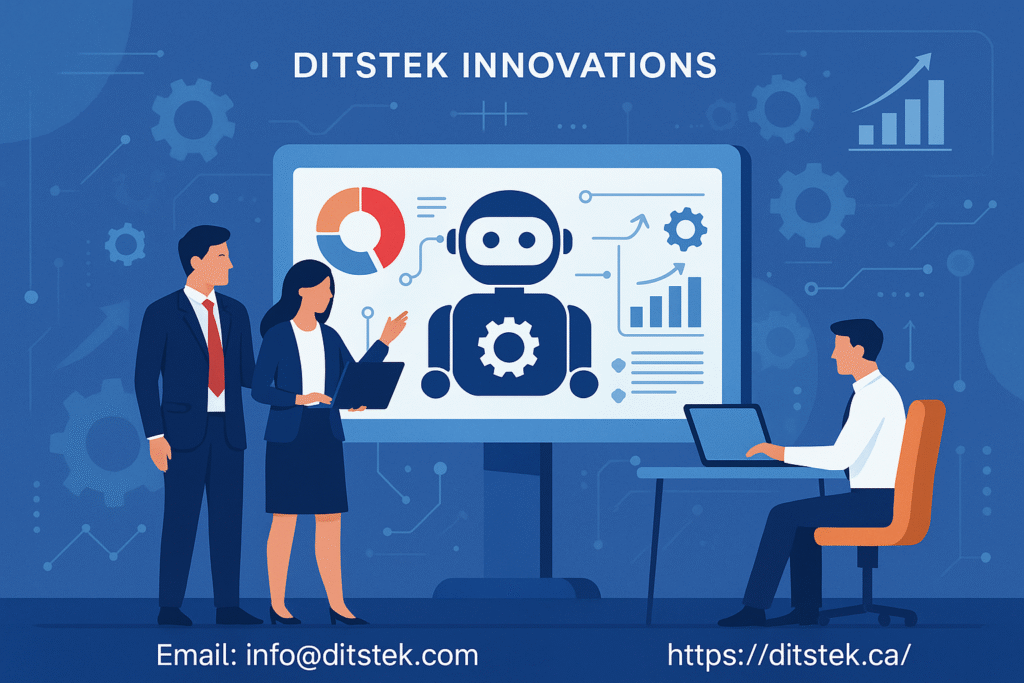Enterprises today face unprecedented pressure to deliver efficiency, agility, and cost savings while also navigating digital transformation. According to Gartner, businesses that embrace automation can reduce operational costs by up to 30%. Yet technology alone cannot guarantee success. To maximize results, enterprises increasingly rely on business process automation consulting as a strategic driver of transformation.
The Growing Role of Automation in Enterprises
Automation is now a fundamental requirement for enterprise growth. By streamlining workflows and reducing manual effort, businesses can improve efficiency, accuracy, and scalability. This section highlights how automation supports core enterprise priorities.
Meeting Rising Customer Expectations
Today’s customers expect seamless, fast, and personalized interactions. Automated workflows ensure quicker service delivery, reduce delays, and improve customer satisfaction by streamlining repetitive processes.
Reducing Operational Costs
Automation lowers costs by replacing manual tasks with streamlined workflows. From finance to supply chains, enterprises achieve greater efficiency, reducing waste and boosting profitability in the process.
Driving Data Accuracy
Manual processes often create errors that impact decision-making. Automation ensures accuracy by reducing inconsistencies, enabling leaders to make more reliable, data-driven decisions.
Supporting Hybrid Workforces
As remote and hybrid work models expand, automation helps maintain consistent workflows across distributed teams, ensuring collaboration and productivity aren’t compromised.
Enabling Scalability
Automated workflows allow enterprises to handle increased volumes without adding staff. This adaptability makes automation vital for enterprises aiming for sustainable growth.
What Is Business Process Automation Consulting?
Consulting ensures automation efforts go beyond basic tools and align with enterprise objectives. Consultants evaluate, strategize, and implement automation in ways that deliver measurable ROI while ensuring smooth adoption across the organization.
Strategic Assessment
Consultants begin with a detailed analysis of existing workflows. They identify bottlenecks, inefficiencies, and redundancies that hold back productivity and highlight opportunities for transformation.
Customized Solutions
Instead of recommending generic software, consultants create tailored automation strategies. These ensure technology aligns directly with industry needs, operational goals, and compliance requirements.
Technology Selection
Choosing the right platform is critical for long-term value. Consultants guide enterprises in selecting tools that balance cost, scalability, security, and integration needs.
Change Management
Adoption is often the biggest barrier to success. Consultants help train employees, foster cultural change, and ensure smooth transitions to new systems.
ROI Measurement
Consultants define clear KPIs and track automation performance. This allows enterprises to measure success and justify investments with quantifiable outcomes.
Why Enterprises Need Expert Consulting
Enterprises face risks when they adopt automation without structured strategies. Consulting provides the expertise needed to align technology with goals, ensure compliance, and drive adoption.
Avoiding Fragmentation
Enterprises often implement too many disconnected tools, leading to inefficiency. Consultants design unified systems that ensure workflows are streamlined and integrated.
Aligning with Strategic Goals
Automation should not be an isolated initiative. Consultants align projects with organizational objectives, ensuring they contribute to long-term competitiveness and growth.
Embedding Compliance
Industries like finance and healthcare require strict adherence to regulations. Consultants build compliance features into automated workflows, reducing legal and financial risks.
Enhancing Adoption
Resistance to change is common in enterprises. Consultants manage training and engagement strategies to help employees embrace automation.
Ensuring Scalability
Consultants ensure automation platforms evolve as the enterprise grows. Scalable design prevents bottlenecks and ensures systems remain effective in dynamic environments.
Benefits of Business Process Automation Consulting
Consulting transforms automation from a technical exercise into a strategic enabler. Benefits span productivity, cost savings, decision-making, and cultural alignment.
Higher Productivity
Automation reduces repetitive tasks, allowing employees to focus on value-driven work like innovation and customer service. This improves overall output and engagement.
Improved Decision-Making
By ensuring access to accurate, real-time data, consultants empower leadership to act quickly and confidently, even in dynamic market conditions.
Cost Optimization
Streamlined workflows eliminate waste and inefficiency. Over time, automation reduces overheads and boosts profit margins across the enterprise.
Better Collaboration
Consultant-led strategies create shared visibility across departments. Teams work together more effectively through connected workflows and transparent data.
Sustainable Growth
Consultants focus on building systems that scale with enterprise growth, ensuring automation strategies support long-term expansion rather than short-term fixes.
Industry Use Cases for Consulting
Every industry has unique challenges. Consultants tailor automation strategies to sector-specific needs, ensuring relevance and measurable impact.
Healthcare
Automation improves billing, patient intake, and compliance workflows, enabling better care delivery and operational efficiency in medical organizations.
Finance
Consultants optimize fraud detection, loan approvals, and compliance tracking, giving financial institutions faster, safer, and more reliable processes.
Logistics
Automated workflows manage fleet operations, order tracking, and supply chain visibility. Consulting ensures efficiency and timely deliveries.
Retail
Inventory management, e-commerce, and customer engagement workflows are streamlined with tailored automation strategies, improving customer loyalty and revenue.
Manufacturing
Consultants help deploy predictive maintenance, production scheduling, and quality assurance systems that minimize downtime and maximize output.
Risks Without Consulting Support
Adopting automation without consulting often leads to poor results. Enterprises may end up wasting money, frustrating employees, or failing compliance audits.
Tool Overload
Many organizations adopt too many platforms, creating inefficiency and data silos. Consultants prevent this by ensuring proper integration.
Low Adoption
Without training and cultural guidance, employees resist new systems, leading to poor ROI and wasted investment.
Compliance Risks
Generic tools often don’t meet regulatory requirements. Consulting ensures automated workflows adhere to industry standards.
Inefficient Processes
If flawed workflows are automated, inefficiency increases. Consultants redesign processes before automation is applied.
Missed ROI
Without clear measurement strategies, enterprises struggle to prove the business value of automation.
How to Select the Right Consulting Partner
Choosing the right partner is crucial for maximizing automation’s benefits. Enterprises should evaluate expertise, industry focus, and support structures carefully.
Proven Experience
Look for consultants with strong portfolios of successful automation projects, backed by case studies and client testimonials.
Industry Knowledge
Consultants with sector-specific knowledge understand regulatory, operational, and compliance needs, ensuring relevance and efficiency.
Technical Depth
Strong expertise in RPA, AI, IoT, and cloud platforms ensures consultants can deploy future-ready solutions.
Change Management Skills
The best consultants combine technical skills with the ability to lead cultural transformation, driving employee adoption.
Ongoing Support
Continuous updates, monitoring, and optimization are essential. Consultants who provide long-term support deliver more sustainable results.
Conclusion
Automation is no longer optional for enterprises—it is a necessity. But without the right strategy, tools alone cannot deliver value. Business process automation consulting provides the expertise, planning, and cultural guidance required to ensure automation delivers measurable ROI, regulatory compliance, and long-term growth. Enterprises that embrace consulting unlock efficiency, agility, and competitive advantage in a fast-changing digital economy.
FAQs
Q1. What is business process automation consulting?
It is the practice of analyzing workflows, designing tailored automation strategies, and ensuring successful implementation aligned with enterprise goals.
Q2. Why do enterprises need consulting instead of just tools?
Consultants align automation with strategy, ensure compliance, improve adoption, and deliver measurable results beyond what tools alone can achieve.
Q3. Which industries benefit most from consulting?
Healthcare, finance, logistics, retail, and manufacturing are leading adopters of consultant-led automation strategies.
Q4. What risks exist without consulting?
Enterprises risk overinvestment, poor adoption, compliance failures, and inefficient processes without expert guidance.
Q5. How do I choose the right consulting partner?
Select consultants with proven expertise, sector-specific knowledge, technical depth, change management skills, and long-term support capabilities.



